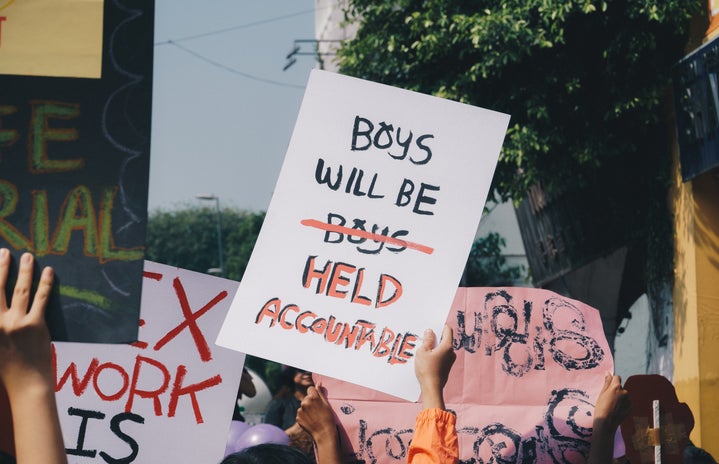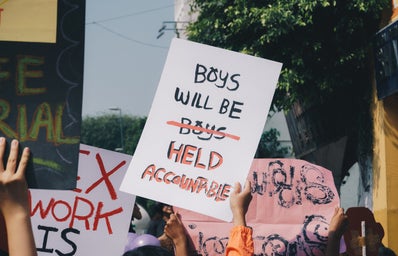TW: Sexual Assault
I think I can speak for all women when I say that the murder of Sarah Everard triggered an intense ache inside of us. That’s the only way I can describe it: like this burning agony in my chest. Before writing this article, I typed her name into google to double check that I was spelling it correctly and when I saw this woman smiling at me, mouth open with her red beanie on, I physically couldn’t stop sobbing. I felt so sick. Even as I write this, my chest just feels heavy. So forgive me if my words come out jumbled or they don’t make sense: they’re packed full emotion and pain and rage. Believe me, I’ve read incredible pieces that put this issue into words so much more articulate than the ones I’m about to use. But yesterday I had a friend ask me “what can men do better?” so here I am, answering his question.
The issue stems so much further than feeling unsafe at night. I remember having a conversation with my brother about why I don’t feel comfortable going out on late night walks when he does so freely. He joked that “rapists don’t just come out when it’s dark, Sharnel.” But what he doesn’t understand is that I feel the same sense of fear, regardless of the time of day. Because I can carry my keys in my hands and send a friend my location. I can facetime my mum on the way home so she knows I’m safe. I will change my route even if it takes me an extra 15 minutes to get home. I will never walk in shoes I can’t run in or a skirt that‘s easy to pull up. I carry an umbrella even in the peak of summer. I will deliberately walk along roads where I know there are houses. I will text my friends when I’m home safe so they can finally go to sleep. But no matter the precautions I take, I will always be at risk. Because we live in a society where people think it’s okay to take what’s not theirs: and a society that teaches boys it’s acceptable to devalue my body, so they feel less guilty taking what’s not theirs.
Your “locker room banter” is and will always be a threat to my life because whenever I hear the phrase “she belongs to the streets” or “You can’t turn a hoe into a housewife,” I’m hearing that my body serves no other purpose than to exist for you and your pleasure. I get (unfairly) angry seeing men share the 97% statistic we’ve all seen. I know it’s coming from a place of support but I imagine them sharing it, thinking their bit is done and then going back to calling their exes “psycho” and a “hoe.” Or bragging about the drunk girl they got with at a party-the one who could barely stand. That statistic upsets me because all women know another who has suffered some form of sexual assault, yet it’s men who find this concept so hard to believe that they start trending #Notallmen on Twitter, rather than actively challenging their own misogyny. But then can I blame you? We’re taught this very black and white approach of what is and isn’t sexual assault. But what about when you made your girlfriend have sex with you after she said no three times but gave in on the fourth? Or when you begged that girl for a hand job and recorded it to show the boys? Does that statistic shock you then? Because out of that figure, 8 out of 10 women will be assaulted by someone they know.
But this isn’t an article about that statistic. It’s about the way you talk about my body in a way that normalises abusing it. The one example that comes to mind is one that is always thrown in my face when debating about why it’s damaging to judge a woman based on her body count: “well a key that opens many locks is a master key, but a lock that opens for many keys is a weak lock.” Allow me to tell you my main issues with that statement:
- Please never reduce my body and my sex down to an inanimate object. If you’re going to use an analogy to shame me for using my body in any way I please, the least you could do is pick one where the subjects at hand, breathe.
- The funny thing about locks is, regardless of what you tell me, I know that they will only open for the right key. Whilst the key itself will try any amount of locks, it’s ultimately the latches’ decision if it wants to open or, more importantly, not.
- When a lock is opened, you will find that it closes right back up again, like magic. It does not get weaker or, contrary to popular belief, looser. In fact I’ve had the same lock on my garage for over 14 years now and if anything, it’s gotten tighter.
- I always find it funny how we assume men are the key in this situation and women are the locks. I understand that this could be simply for phallic reasons. But we talk about the key as if it’s the one with the power. But I’ve had men take me on dates, pay upwards of £100 for meals, pay for my drinks and taxis and offer to pay for a hotel in the hopes that I’d eventually give them what they feel I owe them. And I still didn’t sleep with any of them because I simply did not want to. So tell me again: who really has the power in that dynamic?
- Lastly, I have absolutely no interest in your heteronormative idea of what sex should be in an attempt to make me guilty about confidently using my body.
Reducing me down to an object designed for your possession dehumanises me as a living, breathing person and does nothing but maintain this idea that women is yours to use as you please. You talk about us as if we are merely an extension of you. As if I don’t exist as a human being outside of the purpose you’ve ordered me to serve. I’m not a “sl*t” or “J-bag” or a “b*tch” or a “tease” or “easy” or a “sl*g” just because you’ve decided there are negative connotations around a woman who has sex. I am a person who is smart and capable and ambitious and loving and in the process, I like to have a lot of consensual sex- cry about it.
And the worst part is, I don’t think men truly see how they contribute to this fear that women have of you. It manifests itself in ways that are incomprehensible to men. It’s the cat-calling when we were fifteen, walking home in our school uniforms. It’s the unsolicited d*ck pics. Or being followed on the bus by a guy who “just wanted to wait the extra stop so I could tell you how beautiful you are. I saw you last week so waited for this bus, hoping you would be on it. Would you like me to walk you home?” I was 16. He then proceeded to yell at me, saying that I should be grateful he went through all that effort as if stalking me on the bus is some great romantic gesture. It’s the guys who attack you on Tinder for not replying to their messages within the hour because they feel entitled to my time and energy. It’s the guys who set agendas against girls to avenge their broken egos (I’m looking at you, Piers Morgan). Or, when a woman is brave enough to admit she’s been assaulted, she’s battered with questions like “what were you wearing?”, “how much were you drinking?”, “yeah, but did you lead him on?” So you may not think it’s a big deal when you walk behind a girl on a path or grab her by her waist when you move past her in a club. Or compliment her in a passing moment because you think it’s friendly. But it’s a big deal to us because we know what the worst case scenario could be.
There is so much I could say and want to say on this issue. But I’m conscious of word counts and attention spans. You’ll see so many more amazing articles here on HerCampus and I’ll probably decide to write more in the future because in reality, we’ve only skimmed the surface. But to answer my friend’s question: what can men do better? In the simplest words possible, it starts with your language. The way you talk about us and the words you use normalize violence against us because you take away my value.
I could have used this article to sit here and recount trauma upon trauma that women face daily in an attempt for you to take me and other women seriously but I won’t. I shouldn’t have to describe in graphic detail what women go through for you to believe me. Boys need to realise that you do contribute to this toxic masculinity that does nothing but uphold a dangerous rape culture against women. And finally, it is not, and will never be, my responsibility to incite your change.
My mum used to meet me at the bus stop. She’d sit in the cold, in her slippers and dressing gown, waiting for the number two to arrive. And we’d walk home together. I used to laugh and say that she was being too overprotective. Now I know why.
Words By: Sharnel Wiggins
Edited By: Dasha Pitts-Yushchenko



